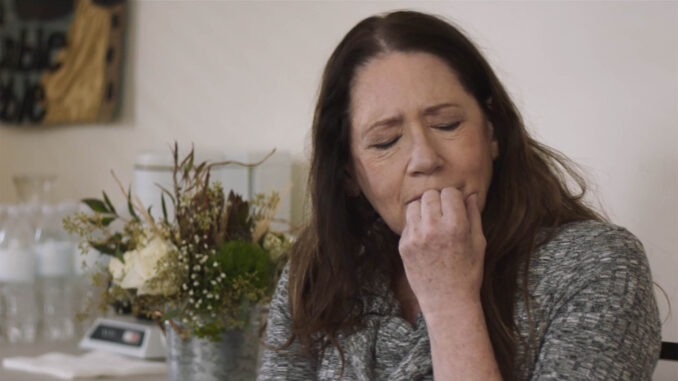Sundance 2021: 'Mass:' The Burden Too Heavy To Bear
- Lydia Smith

- Feb 4, 2021
- 3 min read
Updated: Mar 7, 2022
A church in early winter. The rooms are simple, beige. There’s a reason modern churches often serve as election locations. Fluorescent lighting, brownish-purple carpet, foldable chairs. Every possible way to scream “neutral territory.” This setting serves a definitive purpose in Mass. It is an unsuspecting, unpretentious site to facilitate conversation and exchange between two couples. The first fifteen minutes are literally set-up time, as the peppy, overly solicitous church worker makes the arrangements necessary for this exchange to take place. What could they possibly be so concerned about? I was lucky enough to go in blind to this movie, and have that information relayed to me precisely as intended. The main actors do not themselves arrive until that set-up time is complete. By way of tension, they (and the filmmakers) played my curiosity like a fiddle. Mass is the best film I saw at Sundance 2021.

Out of genuine recommendation that viewers like myself go in blind, I will not be addressing the subject matter at hand, nor the specific roles that the unbelievable Ann Dowd, Jason Isaacs, Martha Plimpton, and Reed Birney play. You can look it up online and find it, but in this evaluation, I’m not going to go there. This is a tragic play that is cinematic because it is subtle. Mass was not a play before it was a movie, unlike many “single room” bottle episodes that have competed to make the most compelling exploration of a few characters in a room. To be written directly for the screen, it had to have something to say. Something considerable, and profound, and wide-reaching. It had to be timely, while not being on the nose. And it had to be interesting. Remarkably, there is never a dull moment in this drab environment. The forces of resentment and regret come to bat, and they spare no gloom. It's draining, to say the least. By the time all has come to pass, you are struck by the sharpness of the contrast between the energy within the room and that which exists outside.
If you have ever participated in organized religion, you’ll likely know the catharsis of a choir. Hymns tend to have a hypnotic effect on the listener. The epiphany of those melodies are emotional. Whether or not you subscribe to any denomination is not necessary to feel the abreaction and consequent sense of peace of a coordinated group of believers soothing the room. That is the final piece of the puzzle. With all of Mass’s bitterness and discomfort and despair, its characters as broken as broken can be, it is rightfully rejuvenating. The relief of aired grievances through the proper processing of grief allows for a renewed sense of gratitude for the past and possibility for the future. Wounds, though not all the way healed, are at least in part forgiven.
These are real people. It is not based on a true story, but as director Fran Kranz explained, it is derived from real events. It would be one thing if I didn’t believe any of the actors, but with a script this potent, it’s impossible to label this story as melodrama. The body language and the blocking tell a story of their own. Regardless, in this case, we observe the greatest possible example of “tell don’t show.” If it is to be said, it has to be said. To be at the table means to lay aside inhibitions and prioritize listening to the uncut version.
This is a very impassioned and cryptic analysis of a movie I have given you next to no details about, and for that I apologize. But because it is so personal, and so emotionally charged, I want to ensure that people do in fact check it out when it gets its wide release, and not turn away because of the darkness of its subject matter. Mass split me into two and then made me whole again. Do not miss this movie.
-Lydia







EssayBox is an online platform providing coursework assistance to students. They offer original, plagiarism-free papers with grammar checks, write my coursework for me ensuring confidentiality and 24/7 support. The service employs native English-speaking experts across various disciplines, guaranteeing timely delivery and tailored solutions for academic success.
https://www.nyjacket.com/product/queen-of-the-ring-emily-bett-rickards-fur-coat/
https://www.theusasuits.com/category/blue-suit/
https://www.chicagojacket.com/product/seven-veils-2025-amanda-seyfried-jacket/
https://tvfashion.net/product/jamie-foxx-navy-embroidered-blazer-on-beat-shazam/
Kaiser OTC benefits provide members with discounts on over-the-counter medications, vitamins, and health essentials, promoting better health management and cost-effective wellness solutions.
Obituaries near me help you find recent death notices, providing information about funeral services, memorials, and tributes for loved ones in your area.
is traveluro legit? Many users have had mixed experiences with the platform, so it's important to read reviews and verify deals before booking.